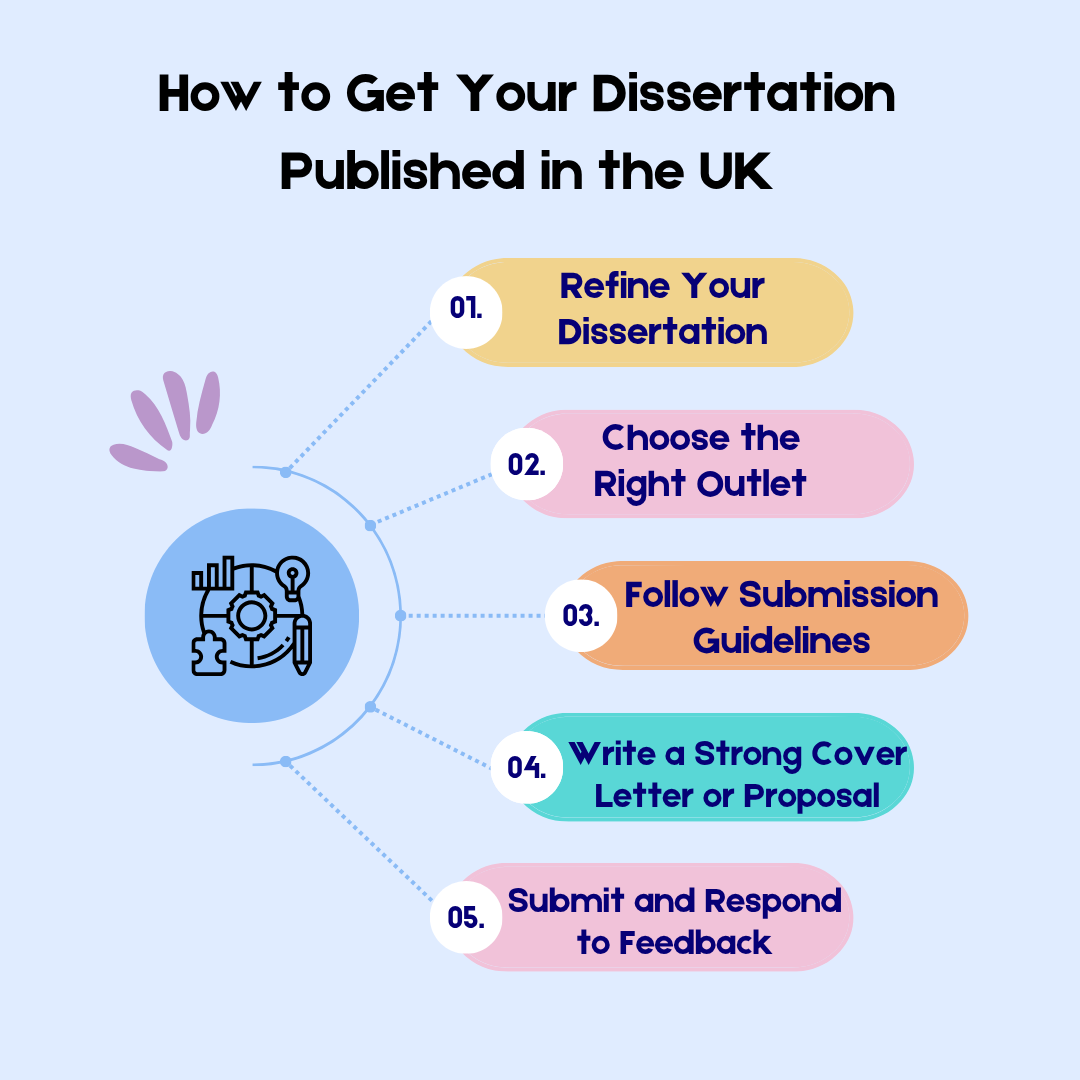
A Complete Guide (2025 Edition)
How to Get Your Dissertation Published in the UK : Publishing your dissertation is a major milestone in your academic journey. It not only validates your research but also contributes to your field and boosts your professional reputation. Whether you’re looking to publish in a journal, as a book, or online, this guide will walk you through every step of the process and help increase your chances of success.
Why Publish Your Dissertation?
-
Increase visibility in your field
-
Build your academic portfolio for postdoctoral or faculty positions
-
Contribute to ongoing research and debates
-
Reach a wider audience through open-access platforms
Top Ways to Publish a Dissertation in 2025
1. Academic Journals
Turning your dissertation into one or more journal articles is the most common route.
How to Do It:
-
Identify peer-reviewed journals in your discipline.
-
Read recent publications to understand tone, structure, and focus.
-
Adapt your dissertation into a concise manuscript (most journals prefer 6,000–10,000 words).
-
Submit and engage with the peer-review process.
2. Book Publishing
If your dissertation has broad appeal or offers new insights, consider publishing it as a book.
Your Options:
-
University presses: Best for academic, well-researched content.
-
Commercial academic publishers like Routledge or Springer.
-
Prepare a book proposal and query letter highlighting your research’s relevance and contribution.
3. Open Access Repositories
Make your dissertation freely accessible through platforms like:
-
ProQuest
-
Open Access Theses and Dissertations (OATD)
-
University digital repositories
-
Digital Commons Network
4. Self-Publishing
Publish your dissertation as an eBook or print edition on:
-
Amazon Kindle Direct Publishing
-
Lulu
-
IngramSpark
Ideal if you want full control over rights and formatting.
5. Academic Platforms
Upload your dissertation or sections of it on:
-
Academia.edu
-
ResearchGate
-
Your personal academic website or blog
These platforms help increase reach and citation potential.
Steps to Get Your Dissertation Published
Step 1: Refine Your Dissertation
-
Revise thoroughly: focus on clarity, structure, and academic tone.
-
Remove redundant sections (e.g., overly detailed literature reviews).
-
Consider hiring a professional editor.
Step 2: Choose the Right Outlet
-
Match your work to a journal’s scope, publisher’s focus, or audience interest.
-
Consider impact factor, review timelines, and acceptance rates.
Step 3: Follow Submission Guidelines
Every journal or publisher has its own requirements. Double-check:
-
Formatting style (APA, MLA, Chicago)
-
Word count
-
Abstract and keywords
-
Citation format
Step 4: Write a Strong Cover Letter or Proposal
-
Summarize your research topic and significance.
-
Explain how your work fits the journal or publisher’s mission.
-
Be professional, concise, and enthusiastic.
Step 5: Submit and Respond to Feedback
-
Accept that peer review often involves major revisions.
-
Be open to criticism and use feedback constructively.
-
Stay patient—publication can take several months.
Copyright & Permissions
Understand the publication’s copyright policy:
-
Some require copyright transfer.
-
Others let you retain rights under Creative Commons licenses.
-
Always read the fine print before signing any agreement.
Boost Your Dissertation’s Impact
Attend Conferences
Presenting your research helps:
-
Get feedback from experts
-
Attract attention from editors or publishers
-
Network with potential collaborators
Leverage Your Academic Network
Talk to your advisor, committee, or colleagues who’ve published before. They can:
-
Recommend suitable journals or presses
-
Review your manuscript
-
Offer insight on what to expect
Promote Your Work Post-Publication
-
Share on LinkedIn, Twitter (X), or academic forums
-
Link in your email signature or online CV
-
Add your publication to Google Scholar
Interesting Tip: Try “Publishing by Chapter”
Instead of submitting the entire dissertation, break it down into individual journal articles, especially if your dissertation includes multiple case studies or themes. This can maximize your exposure and output.
Need Help? Get Professional Support
If the process feels overwhelming, consider getting expert help. Projectsdeal UK offers personalised, step-by-step guidance for publishing your dissertation in UK or international journals. Their academic publishing experts can assist you with:
-
Manuscript editing and formatting
-
Selecting the most suitable journals
-
Navigating the peer-review and revision process
-
Complying with UK-specific academic standards
📞 Contact via WhatsApp for a quick consultation: +44-7447-882377
They provide confidential, professional support tailored for UK PhD students and early-career researchers.
Final Thoughts: Persistence Pays Off
Publishing your dissertation won’t happen overnight. You may face rejections or revision requests, but that’s part of the journey. Stay committed, open to feedback, and proud of your research.
Quick Checklist for Dissertation Publishing
✅ Revise and edit your dissertation
✅ Choose the right publication outlet
✅ Follow submission guidelines
✅ Write a professional cover letter or proposal
✅ Respond to peer-review feedback
✅ Understand copyright
✅ Promote your published work
FAQs
Q: Can I publish my dissertation as is?
A: Rarely. You’ll need to revise it for clarity, length, and format to suit the outlet.
Q: How long does the publication process take?
A: It can take 3–12 months, depending on the journal and review process.
Q: Does publishing affect my copyright?
A: Yes. Some publishers require copyright transfer; others offer more flexible options.